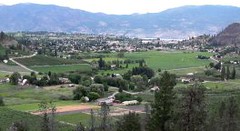Here are some excerpts from the book "Better Not Bigger", by Eben Fodor. New Society Publishers, 1999. Just a sampling, and a precis of some of his points. This book inspired the "better not bigger" bumper stickers. Not a light read, but a worthwhile read!
"Growth for the sake of growth is the ideology of the cancer cell." - Edward Abbey
Statements such as "we have to grow or die", or "we have to grow to get new tax revenue" are repeatedly made to justify growth. They are usually made in an unqualified manner with no supporting evidence.
We are urged to make concessions and sacrifices for development to gain alleged benefits such as new jobs, a bigger tax base, or some vague promise of economic prosperity. We are told that slowing growth would be disastrous and that even if we wanted to slow growth, it would be impossible.
But where is the analysis to prove those claims? It is important to get beyond the rhetoric and base decisions on objective information.
The biggest myths are about taxes, jobs, economic prosperity and housing.
Myth: Growth provides needed tax revenues.
Reality Check: Growth tends to raise local tax rates. The direct and indirect costs of urban growth place new and greater demands on local resources. According to empirical data, becoming a larger town increases the tax burden.
Myth: We have to grow to provide jobs for people in the community:Reality Check: We can’t grow our way out of local employment problems. Growth just makes the problem bigger. The real question is not whether growth creates jobs, but whether it reduces local unemployment.
Myth: If we try to limit growth, housing prices will shoot up.
Reality Check: Growth controls can produce many benefits for a community and may even result in a better distribution of affordable housing than market driven growth. Towns and cities with rapid growth usually have the highest housing prices.
Myth: Growth is inevitable. Growth management doesn’t work and therefore we have no choice but to continue growing. You can’t put a fence around your town.Reality Check: You can establish limits to growth and you can create a "railing" around your community. Saying that "growth is inevitable" implies that we are helpless victims of change, that we must accept whatever growth is thrust upon us, and that our only choice is the manner in which we accommodate it.
We can rein in growth without fences. We can set limits of growth and even cap the ultimate size of our community. We can adopt policies that discourage undesirable kinds of growth. The idea of unlimited, or forced, growth is repulsive. It implies a horrible sickness, like a cancer.
Myth: If you don’t want growth you’re a NIMBY.
Reality Check: NIMBYS have valid concerns! Negative labels are used against concerned citizens to neutralize opposition to growth. However, a NIMBY is more likely to be someone who cares enough about the future of his or her community to get out and protect it. Great NIMBYS of the past kept hazardous waste dumps, major polluters and other nuisances out of their communities.
People who want slow growth tend to be those who really care very much about the future of their communities and want to protect what they value for generations to come. Is it more accurate to refer to such a person as anti-growth or as pro-community?
Myth: Most people don’t really support growth management or environmental protection.
Reality Check: Most people recognise the importance of environmental protection and the need to manage growth.
In numerous studies, on average, over 70% of respondents believe that maintaining a quality environment is more important to economic growth than relaxing environmental standards. In areas that have experienced rapid growth, public opinion surveys consistently show that a strong majority of the public will support policies to curb growth. In 1988 a survey of LA residents showed that 75% favored slowing or stopping growth. We all know how well the politicians listened to that.
Myth We have to "grow or die". Growth makes the economy strong and creates better paying jobs.
Reality Check: The short term benefits of additional growth may not outweigh the longer-term costs.
Myth: Vacant or undeveloped land is just going to waste.
Reality Check: Open space and farmland are valuable and irreplaceable assets that contribute significantly to every community. We all feel regret at the loss of a particular area of open space. What was that land contributing that makes us miss it? A relaxing view, a sense of comfort, tranquility, an oasis of nature, a buffer? Perhaps we’re also disturbed by the permanence of the loss. The farmer’s cows will never graze the pasture that has sprouted a golf course, a mall, or a housing development.
Myth: A persons visual preference is no basis for objecting to development.
Reality Check: The beauty of the land is priceless and its destruction is permanent! That pleasing view may be one of the most significant qualities of a community. Too many people tend to dismiss the benefits of natural landscapes. A 1994 study by the National Association of Home Builders found that the single most important factor affecting the market value of a home was the surrounding environment. When visual preferences carry such a price tag, they can hardly be dismissed as trivial.
Myth: Building more (and bigger) roads will solve the problems of traffic congestion.
Reality Check: Build it and they will come
Myth: Bigger (or More) is better.
Reality Check: Small is beautiful and enough is enough.
Myth: Change is good.
Reality Check: Change is inevitable, but not necessarily good.
These abbreviated excerpts are a sampling of Fodor's work

